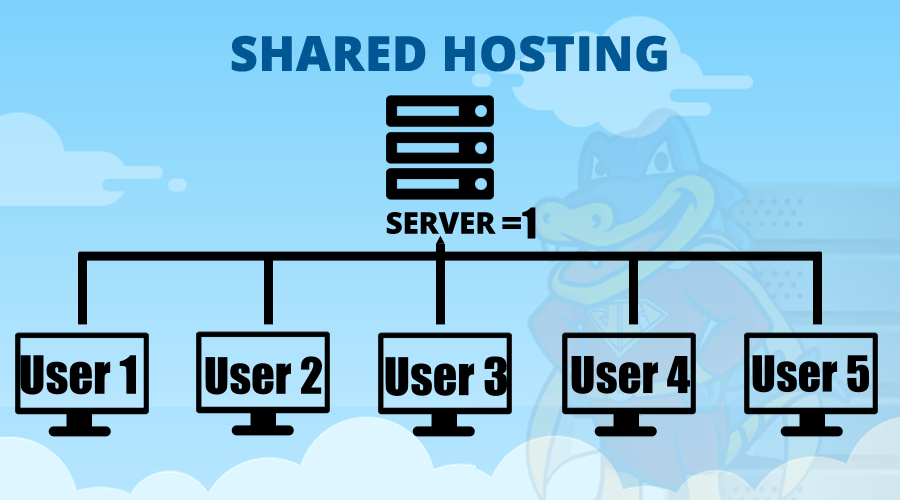Web hosting provides companies and individuals with online space to host websites and make them accessible on the internet. There are several major types of web hosting services to choose from, each with their own unique features, benefits and ideal use cases. Understanding the key differences between web hosting types can help identify the best option for your needs.
Article Highlights
Shared Hosting
Shared web hosting is one of the most common and affordable hosting options. With shared hosting, dozens or even hundreds of websites may be hosted on the same server and share server resources.

The key benefits of using a shared hosting provider include:
- Cost effective – Sharing infrastructure means providers can offer it very inexpensively. Shared plans often start as low as a few dollars per month.
- Easy to use – Shared hosting plans are designed for beginners. The hosting provider manages updates, security, backups, speed optimization and more.
- Scales for small sites – For personal blogs, small business sites or experimental projects, shared hosting provides enough power and space.
However, there are some downsides to consider:
- Limited resources – Websites hosted on the same server compete for resources like CPU, memory and bandwidth. This can cause slower performance during peak traffic times if sites overload the shared capacity.
- Lack of control – With shared infrastructure, you cannot customize software configurations or server settings.
- Security risks – Websites are vulnerable to attacks targeting others on the same server. Malicious or resource-intensive sites can negatively impact all sites.
Therefore, shared hosting is best suited for small, low-traffic personal and commercial websites. But it may not be the right fit for rapidly growing sites expecting more visitors.
Popular shared hosting providers include HostGator, Bluehost and DreamHost.
Also read: What is a Domain Name
WordPress Hosting
WordPress hosting represents hosting plans optimized specifically for hosting WordPress sites and blogs. While WordPress can function on any web host, specialized WordPress hosting delivers a boost in speed and security.

Key features of WordPress hosting include:
- Pre-installed WordPress – Get WordPress set up instantly without manual installation.
- Managed WordPress – Many updates, backups, and security measures are automated.
- Page caching – Caches temporary versions of site pages to speed up performance.
- CDN integration – A content delivery network stores static site assets across global servers, enabling faster loading speeds.
- Domain emails – Get professional branded email addresses associated with your domain.
- WordPress tools – Simplifies staging, development and moving sites across servers.
- Scalable resources – Start with shared then upgrade to dedicated WordPress server configurations to handle increased traffic.
This optimized environment ensures WordPress sites stay secure, speedy and stress-free with minimal website administration and maintenance.
Popular managed WordPress hosting providers include WP Engine, Kinsta and Pagely. WordPress hosting costs more than shared hosting but includes many additional benefits.
VPS Hosting
VPS hosting stands for virtual private server hosting. A physical server splits into multiple virtual servers. The virtual servers keep websites separate and ensure guaranteed resource allocation even though they run on shared hardware.

VPS hosting offers several perks including:
- Guaranteed resources – Assign dedicated RAM and CPU to provide consistent performance.
- Root access – Server access empowers full software customization capabilities not available with shared hosting accounts.
- Enhanced security – Keep software up to date and set firewall rules to effectively block attacks.
- Greater scalability – Scale up specs easily such as RAM, storage and bandwidth as resource needs increase.
- Affordable pricing – Cost sits in the middle between very inexpensive shared hosting and pricy dedicated server hosting because the infrastructure supports different customers.
The virtualized nature provides more control and customization for increased performance, security and growth potential compared to shared hosting.
Well-known VPS hosting providers include InMotion, Hostwinds and Liquid Web.
Dedicated Server Hosting
Dedicated server hosting provides access to an entire physical server. No other customers share the resources resulting in peak security, speed and control.

Advantages of dedicated hosting include:
- Maximum performance – Leverage the server’s full computing capacity solely for your website with no competing sites causing slow downs.
- Powerful hardware – Custom configure server specifications for your exact needs including processor cores, RAM, hard drive space and more.
- Root admin access – Enjoy complete access to customize server settings however you want. Install software, configure security protocols, optimize databases and more.
- Enhanced security – Reduce attack vulnerability with infrastructure completely dedicated to your site or application. No activities from other accounts can pose risks.
- Scalability – Scale up server capabilities seamlessly as your site grows and demands more resources.
The extensive control, customization, security, speed and scalability make this option ideal for large websites with extensive traffic and complex backend needs.
Well-known dedicated hosting providers include InMotion Hosting, HostGator and A2 Hosting.
Also read: Common Types of Online Income Opportunities
Cloud Hosting
Cloud hosting utilizes a network of servers that integrate through a cloud provider’s technology. Websites get distributed across many servers located in different data center locations instead of a single server.

Top cloud hosting advantages:
- Flexibility – Cloud infrastructure supports automatic and instant scaling. Server capacity expands and contracts dynamically in real-time aligned with traffic changes so sites effectively manage spikes.
- High availability – If one server fails, the site seamlessly moves to another using advanced load balancing so visitors won’t notice downtime.
- Managed services – No need to manage infrastructure. The cloud provider handles maintenance, optimizations, security patches and more.
- Pay only for what you use – No set resource capacity means reactive plans havevery affordable minimum fees that increase only when sites drive more traffic.
This modern infrastructure creates extremely resilient, flexible and easy-to-manage hosting well-suited for applications experiencing fluctuating usage and traffic volumes.
Leading cloud hosting platforms include AWS, Microsoft Azure and Google Cloud.
Website Builder Hosting
Many website builder platforms like Wix and Squarespace include proprietary hosting services. Users don’t directly interact with hosting infrastructure. The website builders provide simplified, automated hosting optimized for their platforms.

Pros of website builder hosting integration include:
- Seamless experience – Building and hosting integrates into one solution and dashboard.
- Optimized performance – Hosting configurations specially tune for the website builder’s platform.
- Limited technical skills required – Managing updates, security, scaling and troubleshooting all gets handled behind the scenes.
- Affordable pricing – Low-cost monthly website builder plans include hosting so no extra expenses.
The combination simplifies launching sites by eliminating the need to setup hosting separately. However, some cons exist too:
- Lack of control – Cannot directly access servers or alter configurations beyond website builder adjustments.
- Limited scalability – Hosting still shared so extremely high traffic sites may outgrow capacity.
- Vendor lock-in – Difficult transitioning sites away from proprietary platforms in the future.
Overall, this option best suits beginners wanting a streamlined approach to launch basic sites not expecting exponential growth soon.
Also read: How to Sign Up for Google AdSense
Email Hosting
Email hosting provides managed infrastructure for custom email addresses using a website’s domain name. For example [email protected] instead of [email protected].

Key email hosting features consist of:
- Professional custom addresses – Use domain emails for a polished, branded experience communicating externally.
- Improved deliverability – Legitimate server reputations increase email reach, reducing spam folder sending.
- Robust management tools – Manage accounts and menus through administrative dashboard interfaces rather than basic mail client settings.
- Security filters – Block dangerous attachments and links, quarantine suspected spam, setup SPF/DKIM protocols and more.
- Storage space – Host all past emails without needing to delete anything with extensive included capacity.
This facilitates reliable, secure branded email communication aligned with domain identities and company websites.
Well-known email hosting services include Zoho Mail, Rackspace Email and Fastmail.
Game Hosting
Game hosting provides specialized infrastructure for hosting game servers, typically for multiplayer online games. Performance and capabilities specially configure to handle gaming data transmission needs.

Benefits of utilizing game hosting instead of traditional web hosting include:
- Global CDN – Low-latency data centers across the globe enhance responsiveness for players worldwide.
- DDoS protection – High capacity scrubbing centers filter influxes of fake traffic.
- Fast network – Ensure minimal lag and choppy gameplay.
- Quick support – Get issues escalated and addressed rapidly via 24/7 technical assistance.
- Mod and plugin access – Install gaming mods and plugins for custom game modes tailored to your players.
- Admin console – Monitor server activity through intuitive control panel dashboards.
With the ability to scale server resources aligned with active players while optimizing connectivity, game hosting enables smooth online multiplayer experiences.
Also read: How to Find the Best Keywords for Your Next Web Article
Top providers for game hosting encompass Survival Servers, Host Havoc and Nodecraft.
Differences Between Web Hosting Types
While the various types of hosting offer overlapping basics in providing servers to host websites, significant differences exist:
| Hosting Type | Ideal Use Case | Performance | Control | Price | Scaling |
|---|---|---|---|---|---|
| Shared Hosting | Small personal and commercial sites | Can be slow during peaks | Little customization available | $ | Limited based on shared capacity |
| WordPress Hosting | WordPress sites and blogs | Optimized for WordPress | Moderate customization capabilities | $$ | Upgrade from shared to dedicated resources |
| VPS Hosting | Growing sites needing more control | Fast and consistent guaranteed resources | Significant control with root access | $$$ | Vertical scaling up server specs |
| Dedicated Hosting | Large enterprise sites | Maximum with full resources dedicated | Complete control | $$$$ | Horizontal scaling adding more servers |
| Cloud Hosting | Fluctuating traffic sites | Auto-scaling aligned to real-time needs | Limited without infrastructure access | Pay per actual usage | Excellent instant scaling |
| Website Builder Hosting | Beginner sites using builders | Optimized for platforms | Very little control | $ Included with website builder plans | Constrained options based on proprietary infrastructure |
| Game Hosting | Online multiplayer games | Fast low-latency | Moderate control through game client | $$ | Scale game server specs as needed |
Reviewing the hosting type comparisons makes it easier to select one fitting technical requirements, growth expectations, intended use case and budgetary needs. Needs may also change over time necessitating migrations between hosting solutions as websites evolve.
Also read: How to Earn Money with Websites
Conclusion
Web hosting provides the foundation for every site and application available on the internet. The different types consisting of shared hosting, WordPress hosting, VPS hosting, dedicated server hosting, cloud hosting, website builder hosting and game hosting offer varied features, resources, management involvement, pricing and use case suitability. Comparing the characteristics and targets of each guides decisions when selecting an appropriate hosting provider aligned with your goals. Choosing the right match helps prevent limitations as audiences and workloads expand so you can keep websites stable, accessible and always online with a hosting solution that continues meeting evolving needs over the long-term.
